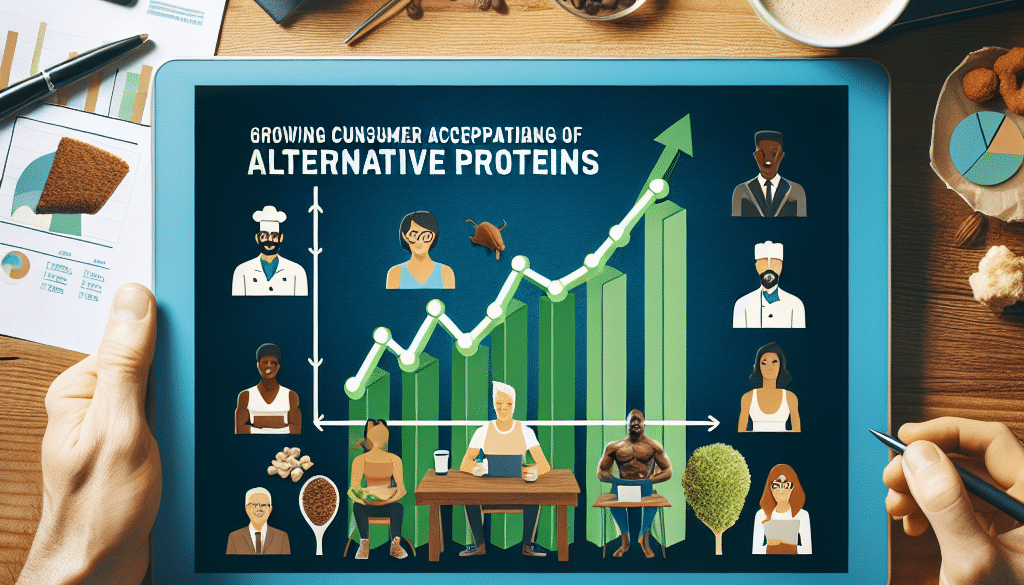Consumer Acceptance of Alternative Proteins on the Rise
Table of Contents
- Alternative Proteins Gain Popularity Among Health-Conscious Consumers
- Understanding the Surge in Alternative Protein Demand
- Environmental Impact and Sustainability
- Health Benefits Attracting Consumers
- Ethical and Animal Welfare Considerations
- Food Security and Technological Advances
- Statistics Highlighting the Rise of Alternative Proteins
- Consumer Acceptance and Market Trends
- Challenges and Future Outlook
- Conclusion: Embracing a Protein-Rich Future
- Discover ETprotein’s High-Quality Alternative Proteins
Alternative Proteins Gain Popularity Among Health-Conscious Consumers

The global food landscape is undergoing a significant transformation as consumer preferences shift towards more sustainable and health-conscious choices. One of the most notable trends in this shift is the rising acceptance of alternative proteins. These proteins, derived from plants, insects, algae, or lab-grown sources, are increasingly seen as viable substitutes for traditional animal-based proteins. This article delves into the reasons behind this growing trend, supported by statistics and insights into consumer behavior.
Understanding the Surge in Alternative Protein Demand
Several factors contribute to the burgeoning demand for alternative proteins. These include environmental concerns, health considerations, ethical issues related to animal welfare, and the increasing need for food security. As awareness of these issues grows, consumers are turning to alternative protein sources that align with their values and lifestyle choices.
Environmental Impact and Sustainability
The production of animal-based proteins is associated with high greenhouse gas emissions, land and water use, and other environmental impacts. In contrast, alternative proteins often have a much lower ecological footprint. For instance, producing plant-based proteins typically requires less water and land and generates fewer emissions than livestock farming. This sustainability aspect is a significant driver for consumers who prioritize environmental stewardship in their dietary choices.
Health Benefits Attracting Consumers
Health-conscious consumers are drawn to alternative proteins due to their nutritional profiles. Many plant-based proteins are rich in fiber, vitamins, and minerals while being lower in saturated fats and cholesterol compared to animal proteins. This aligns with the dietary recommendations of numerous health organizations that advocate for increased plant-based food consumption to reduce the risk of chronic diseases.
Ethical and Animal Welfare Considerations
Animal welfare concerns are another factor influencing the shift towards alternative proteins. A growing segment of the population is adopting vegetarian, vegan, or flexitarian diets to reduce their reliance on animal products. These dietary choices are often motivated by ethical considerations and a desire to promote more humane treatment of animals.
Food Security and Technological Advances
With the global population projected to reach nearly 10 billion by 2050, food security is becoming an increasingly pressing issue. Alternative proteins offer a potential solution to meet the protein needs of a growing population without overburdening natural resources. Technological advances in food science have also made it possible to produce alternative proteins that closely mimic the taste and texture of animal-based proteins, making them more appealing to a broader audience.
Statistics Highlighting the Rise of Alternative Proteins
- According to a report by MarketsandMarkets, the global plant-based protein market size is projected to grow from USD 10.3 billion in 2020 to USD 14.5 billion by 2025, at a CAGR of 7.1% during the forecast period.
- A study by the Good Food Institute revealed that sales of plant-based foods that directly replace animal products have grown 29% in the past two years to reach $5 billion.
- Research by the NPD Group found that nearly 90% of plant-based protein consumers are not vegetarian or vegan, indicating a significant interest in alternative proteins among omnivores.
Consumer Acceptance and Market Trends
The market for alternative proteins is not only growing but also diversifying. Plant-based proteins, such as those derived from soy, peas, and rice, are becoming staples in supermarkets and restaurants. Insect-based proteins are gaining traction in some regions due to their high protein content and sustainability credentials. Algae and lab-grown meats are also emerging as innovative sources of alternative proteins with the potential to disrupt the traditional meat industry.
Consumer acceptance of these alternative proteins is reflected in the increasing number of products and menu items that feature them. Major food companies and fast-food chains are introducing plant-based burgers, sausages, and other meat alternatives, while startups are exploring novel protein sources and production methods to meet consumer demand.
Challenges and Future Outlook
Despite the positive trends, there are challenges to overcome for alternative proteins to reach their full potential. These include scaling up production to achieve price parity with animal proteins, improving the sensory experience to match consumer expectations, and addressing regulatory hurdles. However, with continued investment and innovation in the sector, alternative proteins are poised to become an integral part of the global food system.
Conclusion: Embracing a Protein-Rich Future
The rise in consumer acceptance of alternative proteins is a clear indication of a broader shift towards more sustainable, healthful, and ethical food choices. As the market continues to grow and diversify, it is likely that alternative proteins will play a significant role in shaping the future of food. With ongoing advancements in food technology and a growing awareness of the benefits of alternative proteins, consumers are increasingly open to incorporating these novel sources of nutrition into their diets.
Discover ETprotein’s High-Quality Alternative Proteins
If you’re looking to explore the world of alternative proteins, ETprotein offers a range of high-quality, organic bulk vegan proteins that cater to various industries. Their products, including Organic rice protein, clear rice protein, pea protein, and more, are characterized by a neutral taste and non-GMO, allergen-free attributes. With L-(+)-Ergothioneine purity over 98%, ETprotein’s offerings are ideal for those seeking sustainable and health-conscious protein options.
About ETprotein:
ETprotein, a reputable protein and L-(+)-Ergothioneine (EGT) Chinese factory manufacturer and supplier, is renowned for producing, stocking, exporting, and delivering the highest quality organic bulk vegan proteins and L-(+)-Ergothioneine. They include Organic rice protein, clear rice protein, pea protein, clear pea protein, watermelon seed protein, pumpkin seed protein, sunflower seed protein, mung bean protein, peanut protein, and L-(+)-Ergothioneine EGT Pharmaceutical grade, L-(+)-Ergothioneine EGT food grade, L-(+)-Ergothioneine EGT cosmetic grade, L-(+)-Ergothioneine EGT reference grade and L-(+)-Ergothioneine EGT standard. Their offerings, characterized by a neutral taste, non-GMO, allergen-free attributes, with L-(+)-Ergothioneine purity over 98%, 99%, cater to a diverse range of industries. They serve nutraceutical, pharmaceutical, cosmeceutical, veterinary, as well as food and beverage finished product distributors, traders, and manufacturers across Europe, USA, Canada, Australia, Thailand, Japan, Korea, Brazil, and Chile, among others.
ETprotein specialization includes exporting and delivering tailor-made protein powder and finished nutritional supplements. Their extensive product range covers sectors like Food and Beverage, Sports Nutrition, Weight Management, Dietary Supplements, Health and Wellness Products, and Infant Formula, ensuring comprehensive solutions to meet all your protein needs.
As a trusted company by leading global food and beverage brands and Fortune 500 companies, ETprotein reinforces China’s reputation in the global arena. For more information or to sample their products, please contact them and email sales(at)ETprotein.com today.












